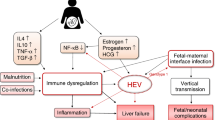Abstract
Preterm infants, especially those with very low birth weight, are at risk of hepatitis B virus infection. They often require invasive diagnostic methods in their first weeks of life, intensive treatment and long-term hospitalisation. Therefore, hepatitis B vaccination is particularly justified in these patients. Our aim was to determine the reaction of preterm children to hepatitis B vaccination. The study comprised 64 preterm children whose birth weight ranged from 700 g to 2460 g (mean 1776.6 g ± 480.4 g) and whose gestational age was between 25 and 36 weeks. A 10 μg dose of the recombinant vaccine Engerix-B (SmithKline Beecham) was given at intervals of 0, 1, 2 and 12 months. In 49.2% of the children vaccination was administered on the 1st day of life, and in the remaining cases between the 2nd and 119th days post delivery. One month after vaccination completion the levels of anti-hepatitis B surface antigen (HBs) antibodies were evaluated. In 98.4% of the vaccinated preterm infants the level of antibodies was >10 mIU/ml. Mean level of anti-HBs antibodies in the group of children with birth weight ≤ 2000 g was 2431.4 mIU/ml, while in those with birth weight >2000 g it was 4803.9 mIU/ml. In children with a birth weight ≤ 1000 g, the mean level of anti-HBs antibodies was significantly lower than in those with birth weight >2000 g. The level of anti-HBs antibodies in children who started vaccination >1st day of life was significantly lower in preterm children with a birth weight ≤ 2000 g than in those with a birth weight >2000 g.
Although vaccination was started on the 1st day of his life, one child with birth weight of 2300 g developed a hepatitis B virus infection. One child did not respond to vaccination (anti-HBs < 10 mIU/ml) and in three cases the response was very poor (11–100 mIU/ml). These patients were given a supplementary booster double dose of Engerix B (20 μg). After 1 month the level of anti-HBs antibodies was evaluated again and high values of 657 mIU/ml to 14520 mIU/ml were observed.
In the group of children with a birth weight ≤ 1000 g the response to vaccination was weaker as compared to children with a birth weight >2000 g (P < 0.05). In systematic mass vaccination programmes, monitoring of antibody levels is not recommended unless the patient is at risk. However, in extremely preterm infants (< 1000 g at birth), especially after very serious infections, monitoring the level of anti-HBs antibodies after complete immunisation should be considered. In preterm infants who show very low post-vaccination levels of anti-HBs antibodies, stimulation with an additional double booster dose of vaccine gives positive results.
Conclusion The majority of preterm infants (98.4%) responded well to hepatitis B vaccination given at intervals of 0, 1, 2 and 12 months and developed a protective level of antibodies. The level of anti-hepatitis B surface antigen antibodies in children with a birth weight >2000 g was higher than in those with a birth weight ≤ 1000 g.
Similar content being viewed by others
Author information
Authors and Affiliations
Additional information
Received: 24 February 1998 / Accepted in revised form: 29 September 1998
Rights and permissions
About this article
Cite this article
Gołębiowska, M., Kardas-Sobantka, D., Chlebna-Sokół, D. et al. Hepatitis B vaccination in preterm infants. Eur J Pediatr 158, 293–297 (1999). https://doi.org/10.1007/s004310051075
Issue Date:
DOI: https://doi.org/10.1007/s004310051075




